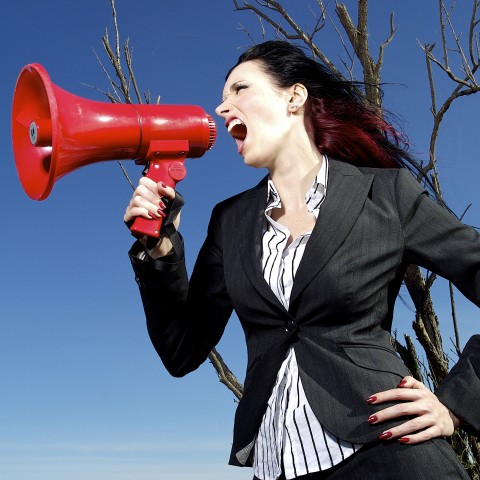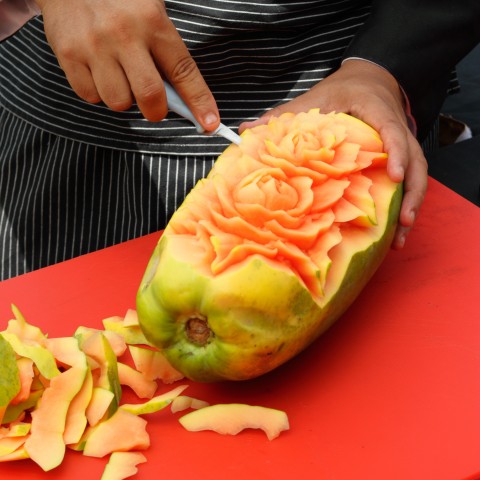Compliments make people feel important and good about themselves. It’s an indispensable part of conversation, too. In this article, you’ll learn various phrases you can use to praise someone for their looks, skills, and work. In addition, we’ll teach you what’s culturally acceptable when someone compliments you in Korea.
- Compliments on Someone’s Look
- Compliments on Someone’s Work
- Compliments on Someone’s Skills
- What to Expect After Giving Compliments
- How KoreanClass101 Can Help You with Your Korean Skills
1. Compliments on Someone’s Look
“You have a beautiful smile!”
1. “Your smile is beautiful.”
| Formal 웃는 얼굴이 아름다워요. Unneun eolguri areumdawoyo.
Informal |
*Add 참 (cham) to give someone a stronger Korean compliment; it means “very” or “really.”
Example:
A: 하하하. 그렇구나.
A: Hahaha. Geureokuna.
A: “Hahaha. I see.”
B: 너 그거알아? 웃는 얼굴이 참 예쁜것 같아. (informal)
B: Neo geugeoara? Unneun eolguri cham yeppeungeot gata.
B: “Do you know that your smile is really beautiful?”
2. “You are beautiful.”
| Formal 미인이세요. Miiniseyo.
Informal |
This phrase is only used to compliment women’s appearance, mainly regarding their face; 멋있어요 (meosisseoyo) is used to compliment men’s appearance. Synonyms of this phrase are:
- 예쁘세요. (yeppeuseyo.) [formal]
- 예쁘다. (yeppeuda.) [informal]
Examples:
Informal:
철수의 딸들은 하나같이 다 미인이야.
Cheolsuui ttaldeureun hanagachi da miiniya.
“Cheolsu’s daughters are all beautiful.”
Formal:
수미씨는 정말 미인이세요.
Sumissineun jeongmal miiniseyo.
“Sumi, you are really beautiful.”
3. “You are handsome.” / “You are cool.”
| Formal 멋있어요. Meosisseoyo.
Informal |
This compliment in Korean can be used to praise both women’s and men’s appearance, as well as their behavior or personality.
Examples:
Formal:
아빠는 신사답고 멋있어요.
Appaneun sinsadapgo meosisseoyo.
“My dad is so gentle and cool.”
Informal:
그 남자는 정말 멋있어.
Geu namjaneun jeongmal meosisseo.
“He is good-looking.”
4. “You look like a celebrity.”
| Formal 연예인 같으세요. Yeonyein gateuseyo.
Informal |
Koreans tend to compliment someone’s appearance by comparing their looks to that of a famous celebrity. Another commonly used phrase is: ~ 닮았어요 (~ dalasseoyo), which means “You look like someone.” Replace 연예인 (yeonyein) with the name of any famous celebrity’s name to complete the sentence.
Example:
Informal:
저 사람 너무 잘생겼다. 꼭 연예인 같아.
Jeo saram neomu jalsaenggyeotda. Kkok yeonyein gata.
“The person over there is so handsome. He looks like a celebrity.“
= 저 사람 너무 잘생겼다. 지드래곤 닮았어.
= Jeo saram neomu jalsaenggyeotda. Jideuraegon dalm`asseo.
= “The person over there is so handsome. He looks like G-dragon.“
5. “You look great in ___.”
| Formal ~이/가 잘 어울려요. ~i/ga jal eoullyeoyo.
Informal |
Use this phrase to compliment someone’s outfit or the color of their clothing. You must add a noun to complete the sentence.
Examples:
Formal:
분홍색이 잘 어울려요.
Bunhongsaegi jal eoullyeoyo.
“You look great in pink.”
Formal:
안경이 잘 어울려요.
Angyeongi jal eoullyeoyo.
“You look great in glasses.”
Want to practice this phrase by saying it with different articles of clothing? Open up our free vocabulary lists on “Winter Clothes” and “Summer Clothes and Accessories” to practice more!
2. Compliments on Someone’s Work
“Im the best!”
6. “Great job!”
| Formal 잘 하셨어요. Jal hasyeosseoyo.
Informal |
Examples:
Formal:
아주 침착하게 잘 하셨어요.
Aju chimchakage jal hasyeosseoyo.
“You handled yourself very well.”
Informal:
빨리 왔네? 잘했어!
Ppalli wanne? Jalhaesseo!
“You came so early. Great job!”
7. “You are the best!”
| Formal 최고예요! Choegoyeyo!
Informal |
You can also say 짱이야 (jjangiya), which is one of the most-used Korean slang compliments. You can only say this to your friends.
Examples:
Formal:
저희는 패션 업계에서 최고입니다.
Jeohuineun paesyeon eopgyeeseo choegoimnida.
“We’re number-one in the fashion business.”
Informal:
철수 너가 최고야!
Cheulsu neoga choegoya!
“You are the best, Cheulsu!”
Informal Slang:
철수 너 짱이야!
Cheulsu neo jjangiya!
“You are the best, Cheulsu!”
8. “The materials you showed at the meeting today were great.”
| Formal 오늘 미팅에서 보여준 자료는 너무 훌륭했어요. Oneul mitingeseo boyeojun jaryoneun neomu hullyunghaesseoyo.
Informal |
These phrases can be used just as they are after someone has given a presentation.
9. “It was a tough project and the results exceeded expectations.”
| Formal 힘든 프로젝트였는데 성과가 기대 이상이에요. Himdeun peurojekteuyeonneunde seonggwaga gidae isangieyo. |
Example:
Formal:
수고했어요. 힘든 프로젝트였는데 성과가 기대 이상이에요.
Sugohaesseoyo. himdeun peurojekteuyeonneunde seonggwaga gidae isangieyo.
“Great work. It was a tough project and the results exceeded expectations.”
Do you need more words for talking about your job or the workplace in general? KoreanClass101 has you covered!
“Your knife skills are awesome!”
3. Compliments on Someone’s Skills
10. “You are good at cooking.”
| Formal 요리 정말 잘하시네요. Yori jeongmal jalhasineyo.
Informal |
정말 잘하시네요 (jeongmal jalhasineyo) means “You are good at something.” If you want to compliment someone on a particular skill, such as cooking, add 요리 (yori) to the front to complete the sentence.
Examples:
Formal:
운동 정말 잘하시네요.
Undong jeongmal jalhasineyo.
“You are good at exercising.”
Informal:
수영 정말 잘하네.
Suyeong jeongmal jalhane.
“You are good at swimming.”
11. “You are good at drawing.”
| Formal 그림 잘 그리시네요. Geurim jal geurisineyo.
Informal |
This is another one of the best Korean compliments to praise someone’s skills. While the grammar construction of the last compliment phrase is to add a noun to the beginning of the sentence, this phrase is to compliment someone’s action.
For example, if someone is good at drawing, the noun for “drawing” is 그림 (geurim) and the verb “to draw” is 그리다 (geurida).Therefore, in order to complete the whole sentence, you need to combine these two words.
Examples:
Formal:
그림 정말 잘 그리시네요.
Geurim jeongmal jal geurisineyo.
“You are good at drawing.”
Informal:
빨리 달리네.
Ppalli dalline.
“You are good at running.”
12. “You speak Korean like a native.”
| Formal 원어민 처럼 한국어를 잘하시네요. Woneomin cheoreom hangugeoreul jalhasineyo.
Informal |
Want to say a different language? It’s easy; simply replace the language with a different language. Check out the Top 38 Languages Spoken in the World page on our website!
Examples:
Formal:
원어민 처럼 러시아어를 잘하시네요.
Woneomin cheoreom reosiaeoreul jalhasineyo.
“You speak Russian like a native speaker.”
Informal:
원어민 처럼 영어를 잘하네.
Woneomin cheoreom yeongeoreul jalhane.
“You speak English like a native speaker.”
13. “Nice picture composition.”
| Formal 사진 구도가 멋지네요. Sajin gudoga meotjineyo.
Informal |
Example:
Formal:
풍경 사진 구도가 멋지네요.
Punggyeong sajin gudoga meotjineyo.
“Your landscape photograph composition is wonderful.”
Do you need some additional vocabulary to complete the phrase? Check out KoreanClass101’s vocabulary list about hobbies!
“I feel awkward when someone compliments me.”
4. What to Expect After Giving Compliments
When you compliment someone in Korea, you’ll notice that the other person will often reply with 아, 아니에요. (a, anieyo), or respond to your compliment with awkward silence or a smile. This is because, to a Korean, accepting compliments confidently is considered rude. Therefore, they do their best to avoid appearing too arrogant to the person giving the compliment.
There are three common phrases to use when someone compliments you in Korea. Let’s have a look.
1. Denying the Compliment
| Formal 아, 아니에요. A, anieyo.
Informal |
Pay close attention to their body language when they deny the compliments. They will do the double hand wave to strongly say “No” to someone. You can read more about this Korean hand gesture in our article, “10 Korean Hand Gestures You Need to Know“.
Examples:
Formal:
A: 한국어 정말 잘하시네요!
A: Hangugeo jeongmal jalhasineyo!
A: “You speak Korean really well!”
Formal:
B: 아, 아니에요. 아직 잘 못해요.
B: A, anieyo. Ajik jal mothaeyo.
B: “Ah, no. I’m still not good at it.”
—
Informal:
C: 대박 너 진짜 빠르다.
C: Daebak neo jinjja ppareuda.
C: “Wow, you are so fast.”
D: 아, 아니야.
D: A, aniya.
D: “Ah, no.”
2. Requesting Assurance
| Formal 정말이에요? Jeongmarieyo?
Informal |
The second way is to request assurance from the person you’re speaking to. Simply respond by saying “Really?” as if you’d never heard the compliment before. In this way, you’ll appear innocent, not arrogant.
Examples:
A: 수진씨 보조개가 참 예쁘네요.
A: Sujinssi bojogaega cham yeppeuneyo.
A: “You have very nice dimples, Sujin.”
B: 정말이에요?
B: Jeongmarieyo?
B: “Really?”
—
Informal:
C: 네가 입고 있는 옷 진짜 이쁜데?
C: Nega ipgo inneun ot jinjja ippeunde?
C: “You look really nice in that dress.”
D: 정말?
D: Jeongmal?
D: “Really?”
3. Accepting the Compliment
| Formal 정말요? 고마워요. Jeongmallyo? Gomawoyo.
Informal |
The third way is to accept someone’s compliment by responding with “Really? Thank you.” In this way, you’ll not appear to be arrogant.
Examples:
Formal:
A: 한국어 정말 잘하네요.
A: Hangugeo jeongmal jalhaneyo.
A: “You speak Korean fluently.”
B: 정말요? 고마워요!
B: Jeongmallyo? Gomawoyo!
B: “Really? Thank you!”
—
Informal:
C: 요리 정말 잘한다!
C: Yori jeongmal jalhanda!
C: “You are so good at cooking!”
D: 정말? 고마워.
D: Jeongmal? Gomawo.
D: “Really? Thank you.”
“Your Korean is so good!”
5. How KoreanClass101 Can Help You with Your Korean Skills
In summary, we learned how to compliment someone in Korean and in various situations. We also went over ways to compliment someone sincerely and how to accept compliments in Korean. Want to learn more compliment phrases? Have a look at these two pages below:
Also check out these pages (in Korean):
We hope that you enjoyed reading this article! Let us know in the comments which Korean compliment is your favorite!
















